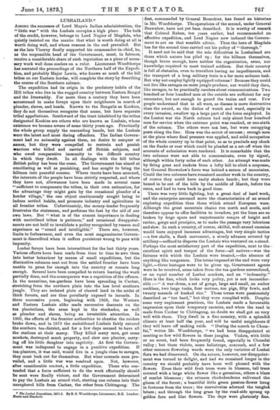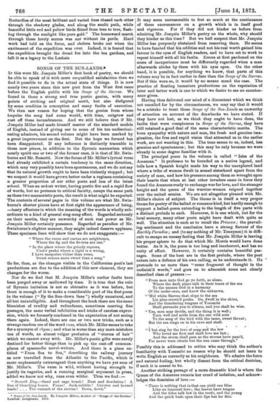LUSHAILAND.* AMONG the successes of Lord Mayo's Indian administration, the
"little war" with the Lushais occupies a high place. The bulk of the credit, however, belongs to Lord Napier of Magdala, who quietly insisted on the maxim that what is worth doing at all is worth doing well, and whose reasons in the end prevailed. But as the late Viceroy finally supported his commander-in-chief, he, as the responsible head of the Government, must, in fairness, receive a considerable share of such reputation as a piece of neces- sary work well done confers on a ruler. Lieutenant Woodthorpe has narrated the proceedings of the Northern half of the Expedi- tion, and probably Major Lewis, who knows so much of the hill tribes on our Eastern border, will complete the story by describing the course of the Southern column.
The expedition had its origin in the predatory habits of the Hill tribes who live in the rugged country between Eastern Bengal and the Irrawaddy. For more than a century they have been accustomed to make forays upon their neighbours in search of plunder, slaves, and heads. Known to the Bengalis as Kookies, they do not themselves recognise that name, but have separate tribal appellations. Southward of the tract inhabited by the tribes designated Kookies are others who are known as Lushais, whose existence we became aware of some thirty years ago. Practically the whole group supply the marauding bands, but the Lushais were the latest and most daring offenders. The Indian Govern- ment had no animosity against them, no desire to conquer or annex, but they were compelled to restrain and punish warriors who killed and carried off British subjects, and who owed comparative immunity to the difficult country in which they dwelt. In all dealings with the hill tribes British policy has been the same. The Government has aimed at conciliating as well as punishing, and has sought to bring the hillmen into peaceful courses. Where tracts have been annexed, the interests of the people have been strictly respected, and where they have not, allowances have been made in several cases "sufficient to compensate the tribes, in their own estimation, for the advantage they might gain by the occasional plunder of a border village," the one object continuously sought being to induce settled habits, and promote industry and agriculture in all frontier tribes. Unfortunately, the money-lender frequently frustrates the statesman, and performs the feat by the aid of our own laws. But "what is of the utmost importance in dealing with uncivilised tribes is patience," and occasional disappoint- ments are not held to invalidate a policy recognised by reason and experience as "sound and intelligible." There are, however, limits to forbearance, and even the most magnanimous Govern- ment is discredited when it suffers persistent wrong to pass with impunity.
Lushai forays have been intermittent for the last thirty years. Various efforts have been made from time to time to awe them into better behaviour by means of small expeditions, but the diminutive columns sent out from the settled frontier have been unable to press far enough into the country or remain long enough. Several have been compelled to return leaving the work partially done, and the consequence was a repetition of the offence. In the meantime, tea-gardens have been spreading in Cachar, stretching from the northern plain into the less level southern jungle. They are isolated plots of cleared land in the midst of thick forests, and are thus peculiarly exposed to inroads. In three successive years, beginning with 1868, the Western and Eastern Lushais alike made successive descents on the tea plantations, the arms kept in the stockades, as well as plunder and slaves, being an irresistible attraction. In 1869, the efforts of the frontier authorities to chastise the raiders broke down, and in 1870 the emboldened Lushais fairly entered the southern tea-district, and for a few days seemed to have all the stations at their mercy. They killed many men, got some muskets, destroyed much property, and slew one planter, carry- ing off his little daughter into captivity. At first the Govern- ment was indisposed to engage in a punitive expedition. If tea-planters, it was said, would live in a jungle close to savages, they must look out for themselves. But wiser counsels soon pre- vailed, and a little war was resolved upon. Not, however, after considerable contest, a little expedition. Those who con- tended that a force sufficient to do the work effectually should be sent were finally victors, and the Government determined to pay the Lushais an armed visit, starting one column into their unexplored hills from Cachar, the other from Chittagong. The
* The Lushaf Expedition, 1871-2. By B. S. Woodthorpe, Lieutenant, B.E. London: Surat and 13Iackett.
first, commanded by General Botuchier, has found an historian in Mr. Woodthorpe. The operations of the second, under General Brownlow, have not yet been described. It is worthy of remark that Colonel Raban, ten years earlier, had recommended an effective expedition, and Lord Napier now induced the Govern- ment to act on that sensible advice. Thus the hero of Magdala. has for the second time carried out his policy of "thorough."
It need not be said that the sole difficulties in Lushailand are those which nature has piled up ; for the hillmen themselves, though brave enough, have neither the organisation, arms, nor knowledge required to meet trained soldiers. But their country is full of obstacles, even to travellers having no impediments, and the transport of a long military train is a far more arduous task.. But why not employ lightly equipped columns? Because they could not live like savages on mere jungle produce, nor would they dare, like savages, to be practically careless about communications. Two hundred or four hundred men at the outside are sufficient for any encounter, but not enough to guard the trains and rear. Few people understand that in all wars, as disease is more destructive than the sword, so the duties of watch and ward, especially in every invasion, swallow up a large part of the force employed. In the Lushai war the North column had only about four hundred men for service when the extreme point was reached, or one-sixth of the column. The others were not lost, but were occupying posts along the line. Hera was the secret of success ; enough men at the place where final pressure was applied, and solid occupation of the whole country up to that point, so as to preclude any check on the flanks or rear which could be pleaded as a set-off when the accounts of submission were rendered. It is remarkable that the two columns were not able to communicate, even by signal,. although within forty miles of each other. An attempt was made by firing guns and rockets from a lofty hill to elicit a response,. but General Brownlow's force was behind a screen of mountains. Could the two columns have remained another week in the country, of course they could have easily shaken hands ; but they were bound to be out of the hills by the middle of March, before the rains, and had to tuna back in good time.
There was very little fighting, but a great deal of hard work, and the enterprise assumed more the characteristics of an armed exploring expedition than those which attend European wars. Although the great mountain chains run north and south, and therefore appear to offer facilities to invaders, yet the lines are se broken by huge spurs and unsystematic ranges of height and ravine, gorge and precipice, as to make the passage very laborious. and slow. In such a country, of course, skilful, well-armed enemies would have enjoyed immense advantages, but very simple tactics- -a few shells, a flank movement, a steady advance covered by artillery—sufficed to disperse the Lushais who ventured on a stand. Perhaps the most satisfactory part of the expedition, next to the • excellent spirit and temper of the force—all natives—was the fairness with which the Lushais were treated,—the absence of anything like vengeance. The terms imposed at the end were very light,—three hostages were to be given up, Government agents were to be received, arms taken from the tea-gardens surrendered, or an equal number of Lushai muskets, and an "indemnity." Here is the fine, which looks very paltry, yet is not inconsider- able :—" A war-drum, a set of gongs, large and small, an amber necklace, two large tusks, four metuas, ten pigs, fifty fowls, and twenty maunds of husked rice." These terms were passionately described as "too hard," but they were complied with. Despite some very unpleasant practices, the Lushais made a favourable impression upon their temporary enemies, and when the road is made from Cachar to Chittagong, no doubt we shall get on very well with them. They dwell in a fine country, with a splendid climate at least half the year, and will be useful neighbours if they will leave off making raids. "During the march to Chum- fai," writes Mr. Woodthorpe, "we had been disappointed at meeting so few wild flowers in these jungles. Violets, with little or no scent, had been frequently found, especially in Chumfai valley ; but these violets, some heliotrope, coxcomb, and a few other common flowering weeds were the only varieties of Lushai flora we had discovered. On the return, however, our disappoint- ment was turned to delight, and had we remained longer in the country we should probably have been well pleased with the flowers. Even their wild fruit trees were in blossom, tall trees, covered with a large white flower like a geranium, others a blaze. of scarlet blossoms ; the crimson rhododendrons enlivened the gloom of the forest; a beautiful little green passion-flower kung in festoons from the trees ; the convolvulus adorned the tangled briars ; and through the long grass by the road-side sprang up golden fern and lilac flowers. The days were gloriously fine. Butterflies of the most brilliant and varied hues chased each other through the shadowy glades, and along the sunlit path, while beautiful little red and yellow birds flitted from tree to tree, flash- ing through the sunlight like pure gold." The homeward march through these lovely scenes was not without its perils. Hard work had told on the force, and cholera broke out when the excitement of the expedition was over. Indeed, it is feared that the expedition brought the dread foe into the tea gardens, and left it as a legacy to the Lushais.



































 Previous page
Previous page